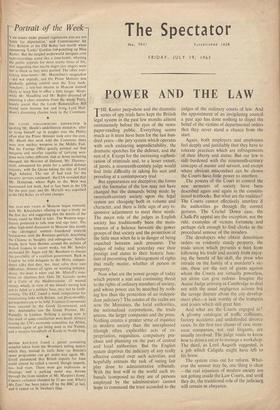--- Portrait of the Week— AM SORRY under present' regulations
you are not liable for deportation,' said Commissioner Sir Eric Roberts at the Old Bailey last month when sentencing 'Lucky' Gordon forlpunching up Miss Keeler. But the tangled underworld intrigues over tape-recordings acted like a time-bomb, whetting the public appetite for more seamy slices of life, and suggesting that ma} be negro jazz singers were not as black as they were painted. The other ever- ticking time-bomb—Mr. Macmillan's resignation —did not explode, and the Prime Minister was gradually gaining control over the Tory back- benchers: a test-ban success in Moscow seemed likely to keep him in office a little longer. Mean- while Mr. Maudling and Mr. Butler dreamed 'of receiving a clear mandate from the whole Party, keenly aware that the Lords Renunciation Bill would soon become law and bring Lord Hail- sham's disarming charms back to the Commons.
TIIE. LATEST PARLIAMENTARY DISTRACTION Is Spotting Mr. Heath's undeliberate mistakes : after so tying himself up in tangles over the Philby affair that the Prime Minister took over the case, Mr. Heath this week told the Commons there were now nuclear weapons in the Middle East. But the Foreign Office quietly pointed out that weapons and missiles capable of carrying wea- pons were rather different. Just as Army recruiting slumped, the Minister of Defence. Mr. Thorney- croft, announced his plans for a unified defence ministry, with the Queen taking the title of Lord High Admiral. The run of bad luck for the security services continued: the CIA revealed that Mr. Dolnytsin, whose flight to the West was announced last week, had in fact been in the US for the past year, and Dr. Martelli was acquitted at the Old Bailey on all nine charges.
*
THE TEST-BAN TALKS in Moscow began riotously with Mr. Khrushchev offering to sign a treaty on the first day and suggesting that the details of the treaty could be filled in later. The Western nego- tiators preferred to talk now and sign later. The other high-level discussion in Moscow this month —the ideological summit—foundered towards breakdown, with the Russians publicly describing the Chinese as 'haughty and outrageous.' Similar insults have been thrown around the politics of British Guiana in recent weeks, but Mr. Sandys persuaded Dr. Jagan and Mr. Burnham to discuss the possibility of a coalition government. Back in London he told delegates to the Malta indepen- dence talks that they, too, must solve their own difficulties. Almost all agree on wanting indepen- dence; the issue is when and Mr. Mintoff's insis- tence on elections first. Only Dr. Ganado spoke of a Cuba of the Mediterranean; all wanted money which, in view of the island's having lost out to Aden as a military base, may not be forth- coming. The EEC found a weak compromise for maintaining links with Britain, and three-monthly get-togethers are to be held. Fourteen Communists were released by the Greek Government, and Mrs. Ambatielos saw the Greek Premier, Mr. Pipinelis, in London. Striking a jarring note in this week of quiet conciliation were South Africa's leaving the UN's economic committee for Africa, rumours again of gas being used in the Yemen, and a massive bloodbath of Kurds in North Iraq.
BRITISH RAILWAYS found a parcel containing samples taken from the Woomera testing station which they mislaid in early June—so Britain's space programme can get under way again. Mr. Erroll announced that British exports for June could almost be called a record, though imports, too, had risen. There were gas explosions in Hastings, and a parking meter was thrown through the front window of Mr. Marples's home. Cinema audiences slumped by 13 per cent, What's My Line? has been taken off by the BBC at last, and it rained on St. Swithin's Day.






























 Previous page
Previous page